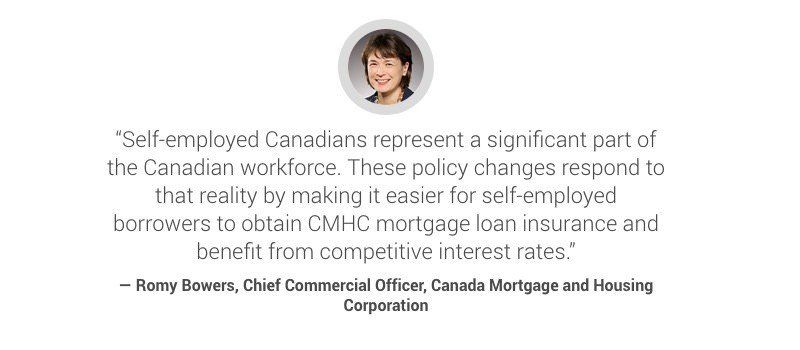More Flexibility for Self-Employed Home Buyers, Coming Soon!
Over the last few years, it's been more a story about tightening rules and regulations, mitigating risk, and restricting lending practices than anything. However the Canadian Mortgage and Housing Corporation (CMHC) just announced that it looks like mortgage financing for self-employed Canadians might just be getting a little more flexible.
Although changes won't come into effect until October of 2018, any news about increased flexibility in mortgage qualification is welcome! Included below is the original press releaseposted on the CMHC website on July 19th 2018.
If you're self-employed and have been considering buying a property, please don't hesitate to reach out to discuss what these new changes might look like for you! Contact me anytime!
CMHC Introduces Changes to Help Self-Employed Canadians Own Their Own Home
Self-employed Canadians are key contributors to strong and vibrant communities and make up about 15% of Canada’s population. However, they may have difficulty qualifying for a mortgage as their incomes may vary or be less predictable.
In line with the National Housing Strategy’smission to address the housing needs of all Canadians, Canada Mortgage and Housing Corporation (CMHC) is making a number of changes aimed at giving lenders more guidance and flexibility to help self-employed borrowers:
- Providing examples of factors that can be used to support the lender’s decision to lend to self-employed borrowers who have been operating their business for less than 24 months, or in the same line of work for less than 24 months such as acquiring an established business, sufficient cash reserves, predictable earnings and previous training and education; and
- Providing a broader range of documentation options to increase flexibility for satisfying income and employment requirements when qualifying self-employed borrowers such as the Notice of Assessment (NOA) accompanied by the T1 General, the CRA Proof of Income Statement and the Statement of Business or Professional Activities (T2125) to support an “add back” approach for grossing up income for sole proprietorship and partnerships.
These enhancements, which apply to both transactional and portfolio insurance, will take effect October 1, 2018.
As Canada’s authority on housing, CMHC contributes to the stability of the housing market and financial system, provides support for Canadians in housing need, and offers objective housing research and information to Canadian governments, consumers and the housing industry.
Backgrounder
Canada’s self-employed workforce are already an important part of the Canadian economy and it is growing, driven partly by an increase in the on-demand economy.
Housing is a vehicle for social inclusion and, through the lens of the National Housing Strategy, CMHC is increasing flexibility for self-employed Canadians.







